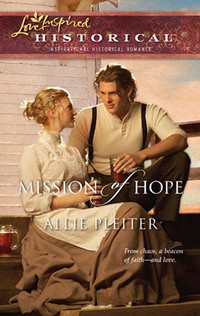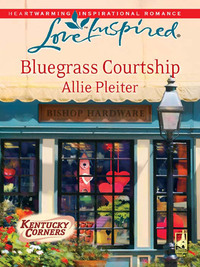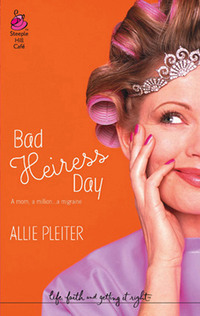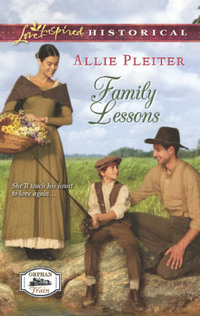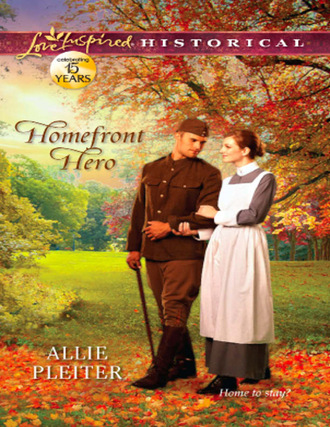
Полная версия
Homefront Hero

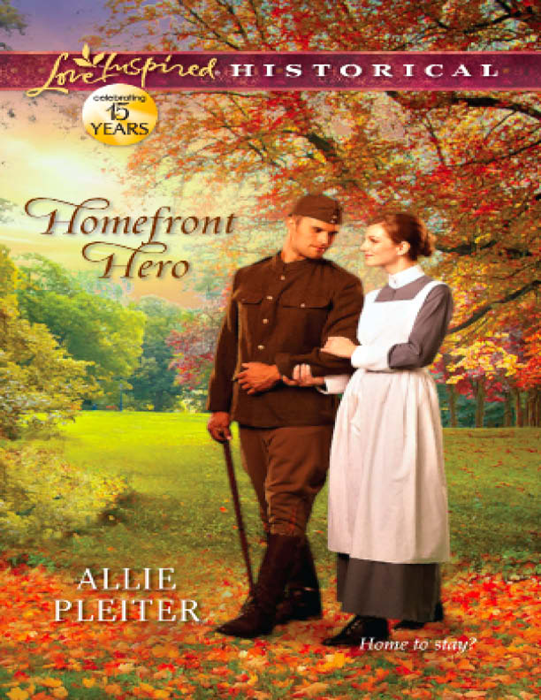
The captain of her heart
Dashing and valiantly wounded, Captain John Gallows could have stepped straight out of a navy recruitment poster. Leanne Sample can’t help being impressed—although the lovely Red Cross volunteer tries to hide it. She knows better than to get attached to the daring captain who is only home to heal and help rally support for the war’s final push. As soon as he’s well enough, he’ll rush back to Europe, back to war—and far away from South Carolina and Leanne. But when an epidemic strikes the university campus, John comes to realize what it truly means to be a hero—Leanne’s hero.
“You gave a stunning presentation, Captain. Yours is a harrowing tale.”
A flicker of a shadow came over his eyes at her use of the word. It was instantly replaced by the cavalier expression. “Ah, but so heroic and inspiring.”
“It makes it unfair that your leg pains you so much.”
She expected him to give some dashing dismissal of the judgment, but he paused. He looked at her as if she were the first person ever to say such a thing, which couldn’t possibly be true. “Why?” It was said in the oddest tone.
“I…” She fumbled, not knowing the answer herself. “I should think it a terrible shame. It seems a very brave thing you’ve done.”
“Wars need heroes,” he said, “and those of us in the wrong place at the wrong time find ourselves drafted into that need. I don’t ponder whether I limp from justice or bravery, Nurse Sample. I just try to walk.”
His smile had a dark edge to it as he walked away. With an odd little catch under her chest, Leanne noted that while he hid it extremely well, he still limped.
ALLIE PLEITER
Enthusiastic but slightly untidy mother of two and RITA® Award finalist Allie Pleiter writes both fiction and nonfiction. An avid knitter and unreformed chocoholic, she spends her days writing books, drinking coffee and finding new ways to avoid housework. Allie grew up in Connecticut, holds a B.S. in speech from Northwestern University and spent fifteen years in the field of professional fundraising. She lives with her husband, children and a Havanese dog named Bella in the suburbs of Chicago, Illinois.
Homefront Hero
Allie Pleiter

www.millsandboon.co.uk
MILLS & BOON
Before you start reading, why not sign up?
Thank you for downloading this Mills & Boon book. If you want to hear about exclusive discounts, special offers and competitions, sign up to our email newsletter today!
SIGN ME UP!
Or simply visit
signup.millsandboon.co.uk
Mills & Boon emails are completely free to receive and you can unsubscribe at any time via the link in any email we send you.
Have I not commanded you?
Be strong and courageous. Do not be afraid;
do not be discouraged, for the Lord your God
will be with you wherever you go.”
— Joshua 1:9
To Suzanne,
a brave hero and a warrior in her own right
Acknowledgments
A wise writer brings lots of good counsel
with her into a historical manuscript.
In addition to John M. Barry’s invaluable book
The Great Influenza, I owe thanks to many other good people who served as sources: Paula Benson, Dr. John Boyd of the 81st Regional Support Command, Susan Craft, Kristina Dunn Johnson
at The South Carolina Confederate Relic Room
and Military Museum, Mary Jo Fairchild at
the South Carolina Historical Society,
Mary J. Manning (and the entire outstanding museum) at the Cantigny First Division Foundation, Nichole Riley at Moncrief Army Community Hospital, Stephanie Sapp at
Jackson Army Base U.S. Army Basic
Combat Training Museum, Christina Shedlock at the Charleston County Public Library and Elizabeth Cassidy West and the other dedicated librarians at the South Caroliniana Library at the University of South Carolina at Columbia. Any factual errors should be laid at my feet, not at the excellent information these people provided me.
Contents
Chapter One
Chapter Two
Chapter Three
Chapter Four
Chapter Five
Chapter Six
Chapter Seven
Chapter Eight
Chapter Nine
Chapter Ten
Chapter Eleven
Chapter Twelve
Chapter Thirteen
Chapter Fourteen
Chapter Fifteen
Chapter Sixteen
Chapter Seventeen
Chapter Eighteen
Chapter Nineteen
Chapter Twenty
Chapter Twenty-One
Chapter Twenty-Two
Chapter Twenty-Three
Chapter Twenty-Four
Chapter Twenty-Five
Chapter Twenty-Six
Chapter Twenty-Seven
Chapter Twenty-Eight
Chapter Twenty-Nine
Chapter Thirty
Chapter Thirty-One
Chapter Thirty-Two
Chapter Thirty-Three
Epilogue
Dear Reader
Questions for Discussion
Chapter One
Camp Jackson Army Base
Columbia, South Carolina
September 1918
“I still can’t believe it.” Leanne Sample gazed around at the busy activity of Camp Jackson. Even with all she’d heard and seen while studying nursing at nearby University of South Carolina, the encampment stunned her. This immense property had only recently been mere sand, pine and brush. Now nearly a thousand buildings created a self-contained city. She was part of that city. Part of the monumental military machine poised to train and treat the boys going to and coming from “over there.” She was a staff nurse at the base army hospital. “We’re really here.”
“Unless I’m seein’ things, we most definitely are here.” Ida Landway, Leanne’s fellow nurse and roommate at the Red Cross House where they and other newer nurses were housed, elbowed her. “I’ve seen it with my own eyes, but I still can barely believe this place wasn’t even here two years ago.” Together they stared at the layout of the orderly, efficient streets and structures, rows upon rows of new buildings standing in formation like their soldier occupants. “It’s a grand, impressive thing, Camp Jackson. Makes me proud.”
Leanne had known Ida briefly during their study program at the university, but now that they were officially installed at the camp, Leanne already knew her prayers for a good friend in the nursing corps had been answered. Different as night and day, Leanne still had found Ida a fast and delightful companion. Ida’s sense of humor was often the perfect antidote to the stresses of military base life. As such, their settling in at the Red Cross House and on the hospital staff had whooshed by her in a matter of days, and been much easier than she’d expected.
Still, “on-staff” nursing life was tiring. “There was so much to do,” Leanne said to Ida as she tilted her face to the early fall sunshine as they chatted with other nurses on the hillside out in front of the Red Cross House. “Too many things are far more complicated in real service then I ever found them in class.”
“A free afternoon. I was wondering if we’d ever get one. Gracious, I remember thinking our class schedules were hard.” Ida rolled her shoulders. “Hard has a whole new meaning to me now.” This afternoon had been their first stretch of free time, and they’d decided to spend an hour doing absolutely nothing before taking the trolley into Columbia to attend a war rally on the USC campus that evening.
“However are you going to have time to do this?” Ida pointed to a notice of base hospital events pinned to a post outside the Red Cross House. “I feel like I’ve barely time to breathe, and you’re already lined up to teach knitting classes.”
“I’ve managed to find the time to teach you,” Leanne reminded her newest student.
“Don’t I know it. I tell you, my mama’s jaw would drop if she saw I’ve already learned to knit. I guess you’ve found right where you fit in the scheme of things around here.”
Ida was right; Leanne had found her place on base almost instantly. As if God had known just where to slot her in, placing an opening for a teacher in the Red Cross sock knitting campaign. If there was anything Leanne knew for certain she could do, it was to knit socks for soldiers. She’d run classes for her schoolmates at the university; it seemed easy as pie to do the same thing here. And it would help her make friends so quickly—hadn’t she already? In only a matter of days the vastness of the base seemed just a wide-open ocean of possibilities.
Of course, there were others who were less thrilled at the opportunities ahead of Leanne—namely, her parents. Mama and Papa had come to see her settled in, and they hadn’t left yet. They’d already stayed on in Columbia two days longer than planned. Papa attributed it to “necessary business contacts” here in the state capital, but Leanne knew better. Mama wasn’t at all calm about the prospect of her daughter being an army nurse. Leanne had agreed to meet her parents for a last luncheon before they caught their train, a final goodbye off base before tonight’s rally. In truth Leanne worried that despite already-packed bags, Mama would invent some other reason to delay their return to Charleston.
Ida must have read her expression. “Oh, stop fretting about your mama and papa, will you? Don’t give them reason to stay one more minute. You’re in for a ten-hankie bout of tears no matter what, so best just to get it over with. Don’t you give them one inch of reason to stay off that train.”
Leanne couldn’t argue. She’d declared to herself that even Mama’s fits of worry would not be permitted to dampen the eager wonder she felt to finally be in service. Leanne squared her shoulders and straightened her spine. “I am a United States Army nurse. I am an educated woman—” she shot a sideways glance at Ida as she adjusted the colored cape that designated her as a leader of the newly graduated nursing class “—and I am a force to be reckoned with.”
“I’ll say an amen to that!” Ida flashed her generous smile that widened further as she pointed to a large new bill posted in a spot all its own. “Speaking of forces to be reckoned with, I reckon our evening will be highly entertaining.” She peered closer at an announcement for the “rousing patriotic speech” to be given by “a true wartime hero.” “‘Hear the daring exploits of Army Captain John Gallows,’” Ida read aloud. “‘Thrill to the tale of how he saved lives at the risk of his own.’ Well, where I come from a gallows is something to be feared.”
Leanne could only laugh. Some days Ida sounded as if West Virginia were the wild, wild West. “Oh, that might still be true here. The Gallowses are a very formidable Charleston family.”
“Have you met them?”
“I’ve not had the pleasure, but I believe our fathers know each other back in Charleston. A fine family going back for generations.”
Ida leaned back and crossed her arms while eyeing the dashing photograph of Captain Gallows that illustrated the announcement. “Fine indeed. He’s certainly handsome enough.” She adjusted her stiff white apron as if primping for the photograph’s admiration. Ida did like to be admired, especially by gallant army officers. “I can’t think of a better way to spend our first free evening off base. Perhaps he’ll let me sketch him.”
“Why is it you want to sketch every handsome man you meet?” Leanne teased. Already she could see it might prove hard to keep her artistically inclined roommate focused on her duties. Ida was a free spirit if ever there was one, and while she took her nursing very seriously, her adventurous nature already pulled her too often away from her tasks.
“I’d be delighted to sit for you,” came a deep voice behind them. “Especially if you are so partial to handsome war heroes.”
Ida and Leanne spun on their heels to find the very man depicted in the photograph. Complete with the dashing smile. Even out of his dress uniform—for he wore a coat, but not one as fancy or full of medals as the one in the photograph—he was every bit the U.S. Army poster-boy hero. His dark hair just barely contained itself in its slick comb-back underneath his cap. He carried himself with unmistakably military command—Leanne suspected she’d have known he was an officer even in civilian clothes. He certainly was very sure of himself—a long moment passed before Leanne even noticed he leaned jauntily on a cane.
Ida planted one hand on her hip. “Well—” her voice grew silky “—no one can fault you for an excess of modesty. Still, my daddy always said a healthy ego was a heroic trait, so I suppose I can let it slide, Captain Gallows.” She drew out the pronunciation of his name with a relish that made Leanne flush.
Captain Gallows was evidently all-too-accustomed to such attentions, for he merely widened his dashing smile and gave a short bow to each of them. “How do you do?” He pointed to the sign. “Say you’ll attend tonight’s event, and my fears of facing an audience full of dull-faced students and soldiers will be put to rest.”
“Are you one of the Four Minute Men, then?” Leanne asked. Her father had been asked to serve on the nationally launched volunteer speakers board, called “Four Minute Men” for the prescribed length of their speeches, but Papa had declined. Still, from the superlatives on his bill, Captain Gallows could go on for four hours and still hold his audience captive.
“The best. They give me as long as I want. They tell me I’m enthralling.”
“I have no doubt they do. I’m Ida Lee Landway, and this is my friend Leanne Sample. We’ve just joined the nursing staff at the base hospital.”
The captain tipped his hat. “How fortunate for our boys in the wards. Miss Landway, Miss Sample, I’m delighted to meet you. Tell me what I can say to convince you to come to the rally.”
“Oh, it won’t take much,” Ida cooed.
“We were just on our way over to town early and already planning to attend,” Leanne corrected. “No persuasion will be required.” He certainly seemed a cocky sort, this Captain Gallows.
“I’m not so sure,” he replied with a disarming grin. “I was on campus this morning and one of the students told me she would come, but she would bring her knitting. Not the kind of response I’m used to, I must say. I’m trying to see it as a patriotic act, not an expectation of my inability to fascinate.”
Definitely a cocky sort. “Don’t take that as an affront at all, Captain Gallows. I’m meeting my parents for luncheon and I have my knitting with me right now.”
“Well, I can’t say I haven’t longed for a sharp pointy stick in several conversations with my own father.”
Leanne didn’t find that especially funny. “The Red Cross encourages us to knit everywhere we can, Captain Gallows.” She tried not to glare as she pointed to the bag currently slung over her shoulder. “I assure you, I knit even in church, so the presence of anyone’s yarn and needles need be no dent to your confidence. Our boys need socks as much as the army needs our boys.”
Gallows tucked a hand in his pocket. “Duly noted, ma’am.” He turned to Ida. “Does the Red Cross know what a fine champion they have in nurse Leanne Sample?”
“They ought to,” Ida boasted. “She’s been here a week and already she’s teaching two knitting classes at the hospital.”
“Impressive,” Gallows replied. “I’m sure the fellows here at the hospital have told you there are days when a pair of warm, dry socks are the highlight of the week. I suppose if I just remember that while you all are staring down at your needles instead of up at me, I’ll be just fine.”
The man enjoyed being the center of attention—that much was clear. “You needn’t worry. Most of us can stitch without even looking. I’ve knit so many pairs of socks I think I could probably knit in my sleep by now.”
“Not me,” Ida said. “Leanne’s a good teacher, but I fear for the feet that’ll have to put up with my socks. I’ll have to stare down a fair amount—” she paused and batted her long auburn eyelashes “—but not the whole time.”
“Well, then.” Gallows rocked back on his boot heels. “I have my orders. I’m to be enthralling but not distracting. Have I got it right?”
“I have no doubt you do such a job very well,” Leanne replied, not wanting to give Ida another chance at that one. “Good day, Captain. We’ve a trolley to catch, but we’ll also catch your enthralling-but-not-distracting presentation this evening.”
Gallows tipped his hat. “You do your bit, I’ll do mine.”
Chapter Two
Captain John Gallows planted his feet—or rather one good foot, one bad foot and the tip of his cane—on the porch of the Camp Jackson officers’ hall. He’d envisioned his homecoming so very differently.
Still, he was in South Carolina, if not yet in Charleston. And home, in the form of his formidable and sharp-pointy-stick-worthy father, had come running to him.
“John.” His father pulled open the door before John even set hand to the knob. He gave John a stiff clap on the back. The force made John put more weight on his bad leg than he would have liked. “Our boy, our hero, home for a bit from the grand tour of rousting up recruits, hmm?”
His father undoubtedly considered talking up war a poor substitute for winning one, but John shook off those thoughts as he shook his father’s hand. “You know me,” he said, applying his most charming smile, “ready to open my big mouth for a good cause.”
“Welcome home, dear,” John’s mother cooed as she emerged from the hall behind his father. “Oh, look at that medal.” She smoothed out the front of his uniform and the medal for bravery that continually hung there now. “My son. Decorated for valor.” The pride in her voice was warm and sugary.
John had saved six lives, but only really in his efforts to keep his own. That didn’t feel like bravery. He wasn’t even supposed to be on that navy dirigible except for a favor he was granting to his commander’s buddy. Still, John could spin a rousing tale and history had thrown him into a dramatic scenario. As such, John had been healed up quickly and delivered to several American cities to give speeches. He was eager to return to fighting, but hoped this recruitment tour would better his chances at being admitted to pilot training. Pilots, now those were the real heroes. If doing his best to stir up the patriotic spirit wherever and whenever asked got him closer to that kind of glory, he’d gladly comply.
“How handsome you look,” Mama went on. “How much older than twenty-two. You walk differently, even.”
John winked. “That would be the cane, ma’am,” he joked, swinging it the way Charlie Chaplin did in the movies. He tipped the corner of his hat for effect.
Father made some sort of a gruff sound, but she laughed. “No, that would be the man, son. I’m not talking about your gait, but the way you carry yourself. With wisdom. Authority.”
“Flattery. Don’t you think you’re just a little bit biased?” he teased her.
“Of course I am,” she said, reaching up to lay a hand on each of his shoulders. “Oh, I am just so glad to have you home!” She hugged him tight. “And for so long a leave! Why, I wouldn’t be surprised if they had this nasty business sewn up before y’all even had a chance to get back over there.”
“Now, Deborah,” John’s father replied in his “let’s be sensible” voice, which had the desirable effect of removing Mama’s hands from John’s shoulders, “I hardly think they’d want Johnny back here making all those speeches if the end is near.” His father’s gaze flicked down momentarily to the black cane. “Besides, you’re here to get the best of care while that leg heals.”
“How is it?” Mama asked, following Father’s gaze.
It hurt. All the time. But John had figured out early on that truth wasn’t always the desired answer. “I’ll be fine,” he said, employing his now-stock reply to all such questions. Most days, it was the truth. Yet every moment since the train had pulled into Columbia, he’d felt odd…as if his body suddenly found his home state a foreign land.
Mama tucked her hand in John’s free arm. “To think of my boy, dangling up there over the water, saving lives at the risk of his very own.” Her voice trailed off and she leaned her head against his shoulder.
Saving lives at the risk of his very own. The words came directly from the press wire he’d seen. From the paper they’d read when they’d pinned the medal on him. From the leaflet that papered the cities where he spoke. Funny, all that bravery sounded like it belonged to someone else, even though John had vivid memories to prove otherwise. No man forgets hanging upside down from the stay wires of a dirigible a mile up and a mile out to sea. An army captain, in the air and out to sea. A fluke of circumstance that turned into a near-death disaster. He’d take the memory of nothing but air between himself and his death to his grave, even if he never spoke of it again. He wished he could never speak of it again, never again hear himself be lauded for an act that had no selfless heroism to it at all. It wasn’t admirable to go to drastic lengths to save an airship when the alternative was crashing into the ocean with it.
“A heroic tale, surely,” Papa boasted. “I imagine the ladies think even more highly of you now.”
Father was right in that respect. The only thing ladies liked more than a man in uniform was a decorated hero in uniform. And John—like every member of the well-bred Gallows family—was a social success even before he slipped into uniform. He’d not lacked for company for one minute of his hospital stay, the voyage home, or his multi-city speaking circuit. “Well, now,” he quipped, “hard to say. The nurses are supposed to be attentive. It’s their job.”
“I have the feeling ‘above and beyond the call of duty’ has a new meaning.” Oscar Gallows laughed. He’d been a dashing soldier in his own day, Mama always said. “Seems to me y’all won’t hurt for company one bit.”
“Do you have to stay at the camp?” Mama asked…again. “Why can’t you come home to Charleston? You’d be so much more comfortable at home with us.”
“The hospital reconstruction therapists are here, Mother. And I am still on active duty. I’ve got to go where they send me.”
Mama pouted. “Tell them to send you home to your mama’s good care.”
“That’s no way for a Gallows to serve, Deborah. John has duties to perform even while he heals. You wouldn’t want him to finish up the war as a mere spokesman, would you?”
Oscar Gallows began strutting toward the general’s house where they had a luncheon engagement before John’s big speech tonight. His father walked quickly, giving no quarter to John’s injured leg.
John wasn’t surprised. A Gallows gave no quarter to anyone, least of all himself.
* * *
“It’s so dry here.” Leanne watched her mama mop her brow and frown over her glass of tea. “And dreadfully hot without any kind of breeze. I don’t know how you don’t just shrivel up.”
In truth, Columbia was a lovely town. It held the University of South Carolina and the state capitol—both as fine cultural centers for the region as any of which Charleston could boast. While it lacked the sea breeze, it also lacked the rain-soaked humidity that sent Charlestonians running out of their city to their beach houses. “I’m half a day to the coast, Mama. And no, I won’t shrivel up. For goodness’ sakes, I’m a nurse… I imagine I’ve learned how to care for myself in the process.”





